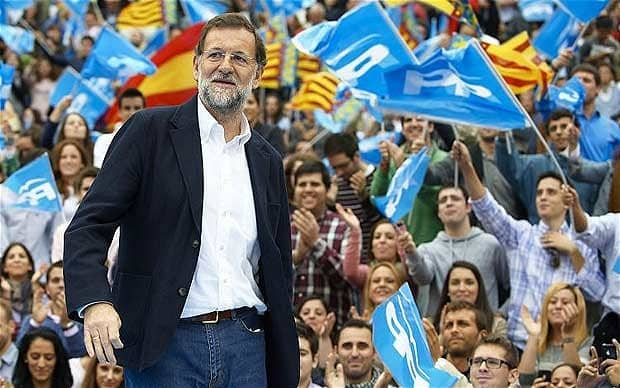
On 27 October 2016, after 314 days of vacillation and two general elections, the Spanish Parliament voted in the conservative Mariano Rajoy as prime minister. The reelection of the People’s Party (PP) candidate was made possible only by the abstention of the social democratic politicians of the Socialist Party (PSOE), who claimed they had a responsibility to prevent the country being forced into a third general election. The European Commission immediately demanded new measures to reduce Spain’s deficit, which will inevitably lead to more cuts and more precarious working conditions. With the PSOE wounded and the left-wing Podemos restructuring its strategy, the stability of Rajoy’s new Brussels-friendly cabinet is yet to be tested. JUANJO RIVAS reports from Madrid.
After the severe crisis in the PSOE (see FRFI 253), its leader Pedro Sanchez was forced to step down at the beginning of October over his refusal to endorse Rajoy as prime minister. Despite groups of militant activists protesting outside the PSOE headquarters, on 24 October the PSOE Federal Committee decided to allow the conservative pro-austerity and corrupt PP to gain office by abstaining in the parliamentary vote. Even so, 15 PSOE deputies voted against the motion to invest Rajoy as prime minister in defiance of the leadership. A number of them now face disciplinary measures. On 29 October, the final results were announced, with the support of the right-wing Ciudadanos party helping Rajoy garner 170 votes; there were 111 votes against and 68 abstentions.
Tens of thousands of people joined a protest near the Parliament denouncing a ‘coup against democracy’, despite the attempts of government officials and the media to dissuade them with statements warning of ‘radical groups’, and a large deployment of riot police to counter them on the day. Meanwhile in the Parliament, the leader of Podemos, Pablo Iglesias, ironically declared that the police presence made no sense as ‘there are more potential criminals inside this chamber than outside’.
During the months of impasse, Mariano Rajoy had reassured the EU that if he succeeded in eventually being elected, his cabinet would adjust the budget and comply with policies to reduce the deficit. On 20 October he had informal talks about the political situation with some European leaders at the EU summit in Brussels. After discussions, the European Commission had decided not to fine Spain and Portugal for failing to meet their deficit targets. On 26 October, as soon as the PSOE decision to abstain made it clear what the outcome would be, the European Commission issued a demand for a commitment from the Spanish government to reduce the deficit from 3.6% to 3.1% of GDP in 2017. The road is paved for new cuts in social welfare, courtesy of a minority government eager to please European pro-austerity policy-makers.
Mariano Rajoy received praise and support from political and market leaders on becoming prime minister. With Francois Hollande of France on his way out and Britain’s Theresa May entangled in handling Brexit, Angela Merkel sees him as an obedient follower. At the multilateral EU summit on 18 November, she declared that from an economic point of view ‘Spain walks on a very positive path’. US president Barack Obama also expressed his relief at Spain’s resolution of its political quandary.
The mainstream media has played a major role during this period in manipulating and misleading public opinion. Prior to the election, there were daily, exaggerated reports on the economic crisis in Venezuela, drawing unfounded parallels with the ‘threat’ posed by Podemos. Since the election, other tactics have been used to undermine the emerging party. The media dwells on nebulous threats of ‘terrorist activity’ as a way of turning public opinion against certain groups, and of deflecting attention from anything that might embarrass the government or the state. A pub fight in which two men were beaten who turned out to be police officers resulted in nine people being arrested and described as Basque promoters of terrorist attacks. When former president Felipe Gonzalez and a media magnate were due to speak at a university in Madrid, the event was cancelled as students peacefully picketed the hall shouting chants about their involvement in state terrorism. The media portrayed the students as radical and violent extremists and claimed Podemos was behind them. On 23 November, the former mayor of Valencia, the PP senator Rita Barberá, who had been involved in several cases of corruption, and had appeared before the court a few days earlier to testify about PP corruption died from a heart attack in a five-star hotel close to the Senate. Although her party had previously tried to distance itself from her, the media’s main concern was to lambast Podemos for the absence of its members in the Congress during a minute of silence for her.
In the long electoral campaign Podemos has tried to gain votes from a broad spectrum of society. The two mainstream leaders accuse the party of being two-faced, on the one hand presenting a confrontational left-wing attitude, to appeal to activists and grassroots movements, and on the other promoting themselves as a respectable new social democratic party, appealing to the general disenchantment that is seeking a ‘reasonable’ solution far from radicalism. The media tries to stir one faction against the other, reporting alleged divisions within the Podemos coalition. Podemos says it aims to combine pressure within official political institutions institutions with dynamic branch work in the communities. However, it has shown itself at times to be changeable and opportunistic, and many grassroots groups are mistrustful of being under its umbrella. These groups are the ones that continue to build in the struggle for decent housing; who fight against TIPP, demonstrated against sexist violence on 25 November, will march for social services and against capitalism on 3 December and so on. These forces are searching for an alternative to strengthen the links between these struggles, rather than blindly relying on a political party that shows signs of steadily becoming an integral part of the political system.




